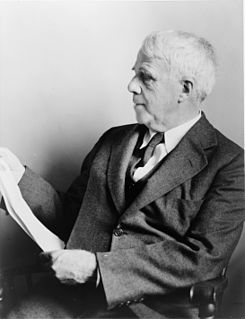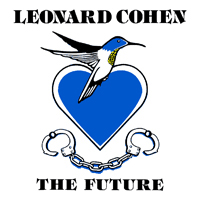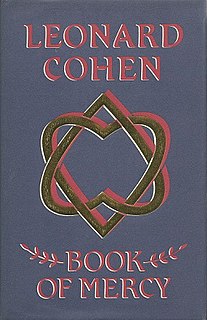Related Research Articles

Robert Lee Frost was an American poet. His work was initially published in England before it was published in the United States. Known for his realistic depictions of rural life and his command of American colloquial speech, Frost frequently wrote about settings from rural life in New England in the early 20th century, using them to examine complex social and philosophical themes.

The Future is the ninth studio album by the Canadian singer-songwriter Leonard Cohen, released in 1992. Almost an hour in length, it was Cohen's longest album up to that date. Both the fall of the Berlin Wall and the 1992 Los Angeles riots took place while Cohen was writing and recording the album, which expressed his sense of the world's turbulence. The album was recorded with a large cast of musicians and engineers in several different studios; the credits list almost 30 female singers. The album built on the success of Cohen's previous album, I'm Your Man, and garnered overwhelmingly positive reviews. The Future made the Top 40 in the UK album charts, went double platinum in Canada, and sold a quarter of a million copies in the U.S., which had previously been unenthusiastic about Cohen's albums.

Dear Heather is the 11th studio album by Canadian singer-songwriter Leonard Cohen, released by Columbia Records in 2004. It was dedicated "in memory of Jack McClelland 1922-2004."

Recent Songs is the sixth studio album by Leonard Cohen, released in 1979. Produced by Cohen alongside Henry Lewy, it was a return to his normal acoustic folk music sound after the Phil Spector-driven experimentation of Death of a Ladies' Man, but now with many jazz and Oriental influences.

I'm Your Man is the eighth studio album by Canadian singer Leonard Cohen, released on February 2, 1988 by Columbia Records. The album marked Cohen's further move to a more modern sound, with many songs having a synthesizer-oriented production. It soon became the most successful album which Cohen had released in the US, and it reached number one in several European countries, transforming Cohen into a best-selling artist.

Daniel Mark Epstein is an American poet, dramatist, and biographer. His poetry has been noted for its erotic and spiritual lyricism, as well as its power—in several dramatic monologues—in capturing crucial moments of American history. While he has continued to publish poetry he is more widely known for his biographies of Nat King Cole, Edna St. Vincent Millay, Bob Dylan and Abraham Lincoln, and his radio plays, "Star of Wonder," and "The Two Menorahs," which have become holiday mainstays on National Public Radio.

Abraham Moses Klein was a Canadian poet, journalist, novelist, short story writer and lawyer. He has been called "one of Canada's greatest poets and a leading figure in Jewish-Canadian culture."

"Hallelujah" is a song written by Canadian singer Leonard Cohen, originally released on his album Various Positions (1984). Achieving little initial success, the song found greater popular acclaim through a new version recorded by John Cale in 1991, which inspired a recording of Cale's version by Jeff Buckley in 1994.

Book of Longing was the first new poetry book by Leonard Cohen since 1984's Book of Mercy. First published in 2006 by McClelland and Stewart, Book of Longing contains 167 previously unpublished poems and drawings, mostly written at a Zen monastery on Mount Baldy in California, where Cohen lived from 1994 to 1999, and in India, which he visited regularly during the late 1990s. The book also incorporates a number of poems written after his 1978 book, Death of a Lady's Man. These presumably were left out of his 1984 Book of Mercy, which contained only psalm-like meditations. Book of Longing also collects some of the lyrics to songs from the albums Ten New Songs (2001) and Dear Heather (2004). Many of these poems were first published at The Blackening Pages of The Leonard Cohen Files website.
"The Partisan" is an anti-fascist anthem about the French Resistance in World War II. The song was composed in 1943 by Russian-born Anna Marly (1917–2006), with lyrics by French Resistance leader Emmanuel d'Astier de La Vigerie (1900–1969), and originally titled "La Complainte du partisan". Marly performed it and other songs on the BBC's French service, through which she and her songs were an inspiration to the Resistance. A number of French artists have recorded and released versions of the song since, but it is better recognised globally in its significantly, both musically and in the meaning of its lyrics, different English adaptation by Hy Zaret (1907–2007), best known as the lyricist of "Unchained Melody".

Aileen Lucia Fisher was an American writer of more than a hundred children's books, including poetry, picture books in verse, prose about nature and America, biographies, Bible-themed books, plays, and articles for magazines and journals. Her poems have been anthologized many times and are frequently used in textbooks. In 1978 she was awarded the second National Council of Teachers of English Award for Excellence in Poetry for Children. Born in Michigan, Fisher moved to Colorado as an adult and lived there for the rest of her life.

Adam Cohen is a Canadian singer-songwriter. As a recording artist, he has released four major label albums, three in English and one in French. His album We Go Home was released on September 15, 2014. Currently residing in Los Angeles, he is also part of the pop-rock band Low Millions from California.
"Take This Waltz" is a song by Canadian singer-songwriter Leonard Cohen, originally released as part of the 1986 Federico García Lorca tribute album Poets in New York and as a single.

Leonard Norman Cohen was a Canadian singer-songwriter, poet and novelist. His work explored religion, politics, isolation, depression, sexuality, loss, death, and romantic relationships. He was inducted into the Canadian Music Hall of Fame, the Canadian Songwriters Hall of Fame, and the Rock and Roll Hall of Fame. He was invested as a Companion of the Order of Canada, the nation's highest civilian honour. In 2011, he received one of the Prince of Asturias Awards for literature and the ninth Glenn Gould Prize.

The Ayn Rand Cult is a book by journalist Jeff Walker, published by Open Court Publishing Company in 1999. Walker discusses the history of the Objectivist movement started by novelist and philosopher Ayn Rand, which he describes as a cult.

June 30th, June 30th is a poetry collection published in 1978 by American writer Richard Brautigan. It was his eighth book of poetry and the last released in his lifetime. It contains 77 poems that Brautigan wrote in 1976 during his seven-week stay in Japan, presented in a diary-like format. The title is the date he planned to leave the country.

Book of Mercy is a poetry book by Canadian author, poet and singer-songwriter Leonard Cohen, published by McClelland and Stewart, and repackaged in March 2010. Its original publication was in 1984. Book of Mercy is considered a companion volume to Cohen's poetry collection, Book of Longing. The book is often referred to as a book of contemporary psalms. The poems are numbered rather than titled. Book of Mercy contains fifty poems. The topics are often spiritual or religious in nature.

Thanks for the Dance is the fifteenth and final studio album by Canadian singer-songwriter Leonard Cohen, released posthumously through Columbia Records and Legacy Recordings on November 22, 2019. It is the first release following Cohen's death in November 2016, and includes contributions from various musicians, such as Daniel Lanois, Beck, Jennifer Warnes, Damien Rice and Leslie Feist. The song "The Goal" was released with the announcement of the album, on September 20, 2019.

Flamer is a semi-autobiographical graphic novel by Mike Curato. It is set in 1995, in a Boy Scouts summer camp, and tells the story of Aiden, who is bullied for his appearance, including acting in a manner considered stereotypical of gay men. Curato was a scout and based his experience as a closeted teenager to write the novel.
A Ballet of Lepers: A Novel and Stories is a posthumous collection of fiction by Canadian author and singer-songwriter Leonard Cohen, consisting of the novella A Ballet of Lepers, fifteen short stories and a précis for a play. The collection was edited, with an afterword, by Alexandra Pleshoyano and was published in 2022.
References
- 1 2 Leonard Cohen (2018). The Flame. Edinburgh: Canongate Books Ltd.
- ↑ "The Flame: Poems Notebooks Lyrics Drawings". Kirkus Reviews . Retrieved 19 October 2022.
- ↑ William Logan (2 January 2019). "Leonard Cohen's Posthumous Collection of Poems, Lyrics and Sketches". The New York Times . Retrieved 19 October 2022.
- ↑ Abigail Ulman (3 January 2019). "The Flame review: Leonard Cohen's final collection of writings". The Age . Retrieved 19 October 2022.